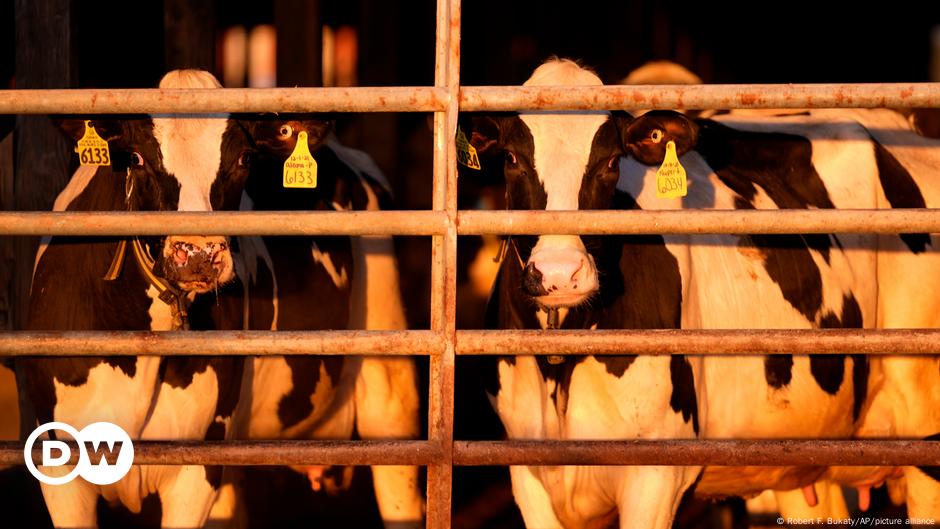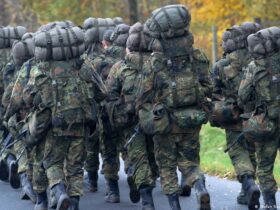The spread of H5N1 avian influenza in North America has put countries other than the United States on alert.
Some governments are purchasing vaccine stocks and taking precautionary measures in response to the spreading virus.
The bird flu variant has infected about 700 dairy herds between March and early December 2024 – mainly in California on the US West Coast. More than 1,200 commercial and backyard poultry facilities and hobbyist bird flocks have also been infected.
H5N1 has also been found in raw milk from a pig in the northwestern state of Oregon and from a cow in California.
About 60 people – mainly agricultural workers working near infected cattle and chickens – have been infected.
At least two adults in the Midwestern state of Missouri, a child in California and another child in British Columbia, Canada, have been infected from an unknown source.
Although no cases of human-to-human transmission have been recorded, there are concerns that the H5N1 variant may be one mutation away from becoming a major public health concern.
A study published in Science Journal On December 5, it was found that a single genetic change in circulating H5N1 has enabled it to jump more easily from other mammals to humans.
“We’re particularly concerned about pigs because we know from many other outbreaks that pigs are carriers of influenza viruses,” Meghan Davis, an environmental health researcher at the Johns Hopkins Bloomberg School of Public Health, told DW’s Science Unscripted podcast. are the mixing carriers for.
Davis said the ability of influenza to exchange genetic information inside mammals means a very different, potentially dangerous pathogen could evolve. Genetic changes in the virus may make it easier to spread among humans.
Is a new epidemic emerging?
Even before the spread of SARS-CoV-2 — the virus that causes COVID-19 — health scientists warned that there was a risk of an emerging pandemic.
Ultimately it was a new coronavirus, not an influenza strain that sparked the pandemic. But the possibility of a global influenza-induced event was – and is – cause for concern.
“With H5N1, there is a big unknown,” Peter J. Hotez, dean of the National School of Tropical Medicine at Baylor College of Medicine in the US state of Texas, told Science Unscripted.
“We know there is a possibility that a significant bird flu pandemic could occur, perhaps similar to the 1918 flu pandemic,” Hotez said, “but we can’t say when that will happen.”
Other countries are increasing surveillance and precautionary measures. The UK government has ordered five million doses of the H5 influenza vaccine this week. In November, a case of H5N1 was confirmed at a poultry farm in Cornwall, in the south-west of England.
“I agree with what the UK did because it’s not like you can press a button and suddenly you’ll have millions of doses [H5 vaccine] appear,” Hotez said. “Making a flu vaccine the traditional way is a slow process.”
Hotez described the rate of pandemic threats as a “regular cadence”, pointing to SARS in 2002 and MERS in 2012, which were dangerous but did not escalate globally.
A pandemic was declared in 2009 due to H1N1 influenza, although its impact did not match that of COVID-19.
“We have to be prepared for H5N1. We’ve also seen this increase in Ebola and other filoviruses.” [severe hemorrhagic] The infections that we’re seeing — we have to be prepared for that,” Hotez said. “And we’re starting to see [a rise in] Mosquitoes spread viral infections such as dengue and chikungunya, and then Zika virus infections in both southern Europe and the southern United States.”
‘They are contrarians, they are activists’
Scientists and health experts in the United States have expressed concern about several nominations and appointments made by President-elect Donald Trump for his incoming administration.
Trump’s picks include Robert F. Kennedy Jr. to lead the Department of Health and Human Services and Dave Weldon for the top post at the Centers for Disease Control and Prevention.
Kennedy and Weldon are known for their opposition to vaccination.
Although Trump was president at the beginning of the coronavirus pandemic and has led massive investments in vaccine supply security through programs like Operation Warp Speed, Hotez said the absence of people with established experience in health issues in Trump’s new administration is worrisome. Is.
,[In Trump’s first administration] “They were fairly mainstream public health doctors and public health scientists, but this new wave is something different — they’re contrarians, they’re activists, they’ve campaigned openly against vaccines and interventions,” Hotez said.
Health experts in other countries are closely watching how H5N1 is handled in North America.
“The current incidence of infection in the US requires us to closely study virus samples from humans and other animals,” said Martin Schwemle, a virologist at Freiburg University Medical Center.
The European Center for Disease Prevention and Control said In the November 2024 report It “is continuing to monitor the US and Canadian situations in collaboration with partner organizations in Europe and will continue to update its assessment of the risk to humans as new information becomes available.”
It also recommended increased surveillance of people exposed to avian influenza, and that doctors and nurses ask patients if they have had any contact with animals.
Edited by: Zulfikar Abbani
Source:
H5 Bird Flu: Current Situation. U.S. Centers for Disease Control and Prevention






Leave a Reply